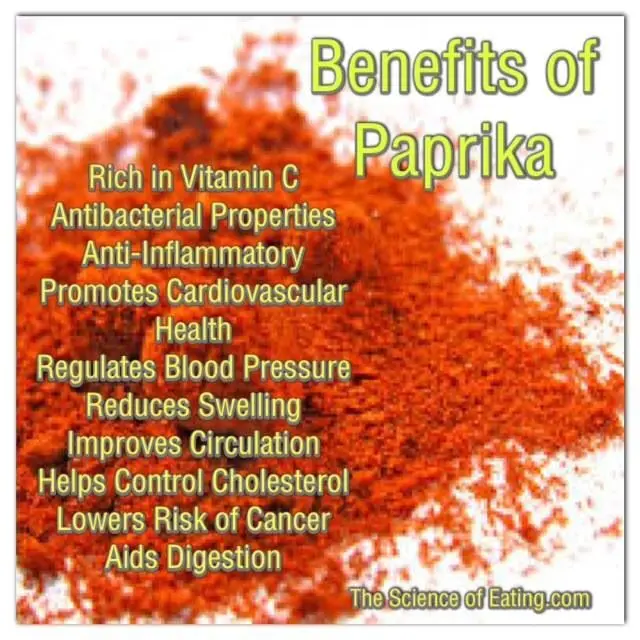Smoked paprika, derived from Capsicum annuum L., is a flavorful spice commonly used in cooking. It not only adds a delightful smoky flavor to dishes, but it also offers a range of health benefits. From its antioxidant properties to its potential effects on liver health, smoked paprika is a versatile spice that can enhance both the taste and nutritional value of your meals.

The Role of Smoked Paprika in Liver Health
The liver plays a crucial role in metabolizing fats from the diet and maintaining overall lipid metabolism. Dysregulation of lipid metabolism can lead to the accumulation of lipids in the liver, a condition known as hepatosteatosis. This is often associated with obesity and increased risk of chronic diseases such as type 2 diabetes, hypertension, and cardiovascular disease.
Research suggests that a diet rich in fat can contribute to the development of obesity and insulin resistance, further exacerbating liver health issues (Bray, Paeratakul, & Popkin, 2004). However, studies have shown that certain compounds present in smoked paprika, such as capsanthin, may have protective effects on dysregulated lipid metabolism in the liver (Maeda, Saito, Nakamura, & Maoka, 2013).
Capsanthin, a major carotenoid found in red paprika, has been found to:
- Act as a free-radical scavenger, reducing oxidative stress in the liver (Bendich & Olson, 1989).
- Exhibit anti-tumor activity, potentially reducing the risk of certain cancers (Maoka, Enjo, Tokuda, & Nishino, 2004).
- Attenuate obesity-induced inflammation, promoting a healthier liver (Maeda, Saito, Nakamura, & Maoka, 2013).
- Raise plasma high-density lipoprotein (HDL) cholesterol levels, which is beneficial for heart health (Aizawa & Inakuma, 2009).
While further research is needed to fully understand the effects of smoked paprika on liver health, these initial findings suggest that incorporating this spice into your diet may have potential benefits for your liver.
Additional Nutritional Benefits of Smoked Paprika
Aside from its potential impact on liver health, smoked paprika offers a range of additional nutritional benefits. It is a good source of various phytochemicals, vitamins, minerals, and flavonoids (Kim, Ahn, Ha et al., 2011, Kim, An et al., 2016, Kim, Ahn, Lee et al., 2011, Matsufuji et al., 2007).
Some of the key nutrients found in smoked paprika include:
- Carotenoids: Smoked paprika contains carotenoids, such as capsanthin, which are powerful antioxidants that help protect cells from damage caused by free radicals.
- Vitamins: It is a good source of vitamins A, E, and C, which are essential for maintaining healthy skin, boosting the immune system, and promoting overall well-being.
- Minerals: Smoked paprika contains minerals like potassium, iron, and magnesium, which are important for various bodily functions, including nerve function, muscle contraction, and blood pressure regulation.
- Flavonoids: These compounds have antioxidant and anti-inflammatory properties, and may help reduce the risk of chronic diseases.
By incorporating smoked paprika into your meals, you can not only enhance the taste but also increase the nutritional value of your dishes.
How to Use Smoked Paprika in Your Cooking
Smoked paprika can be used in a variety of dishes to add a rich, smoky flavor. Here are some ideas for incorporating this spice into your cooking:
- Season meats and vegetables: Sprinkle smoked paprika on chicken, beef, or roasted vegetables to add a smoky and savory taste.
- Add to soups and stews: Enhance the flavor of your soups and stews by adding a pinch of smoked paprika.
- Create marinades and rubs: Mix smoked paprika with other herbs and spices to create flavorful marinades and rubs for grilled or roasted meats.
- Spice up dips and sauces: Add a dash of smoked paprika to your favorite dips and sauces, such as hummus or tomato sauce, for an extra depth of flavor.
Experiment with smoked paprika in your recipes to discover new and exciting flavor combinations.
Is smoked paprika spicy?
No, smoked paprika is not typically spicy. It is made from dried peppers that have been smoked, resulting in a smoky flavor rather than heat. However, there are different varieties of smoked paprika, so it's always a good idea to check the label if you prefer a milder or spicier option.
Can smoked paprika be used as a substitute for regular paprika?
Yes, smoked paprika can be used as a substitute for regular paprika in recipes. However, keep in mind that it will add a distinct smoky flavor to your dishes. If you prefer a more traditional paprika taste, you may want to use a combination of both smoked and regular paprika.
Can smoked paprika be used in vegetarian or vegan dishes?
Absolutely! Smoked paprika is a great addition to vegetarian and vegan dishes, as it adds depth and complexity to plant-based meals. Try using it in bean stews, roasted vegetables, or tofu dishes for a smoky twist.
Smoked paprika not only enhances the taste of your meals but also offers a range of potential health benefits. From its potential effects on liver health to its antioxidant properties, this versatile spice can be a valuable addition to your diet. Whether you're a meat lover or a vegetarian, smoked paprika can add a delightful smoky flavor to a variety of dishes. So go ahead and experiment with this flavorful spice to elevate your culinary creations and boost your overall well-being.
If you want to know other articles similar to Health benefits of smoked paprika: enhance taste & boost health you can visit the Spices category.


Related Articles